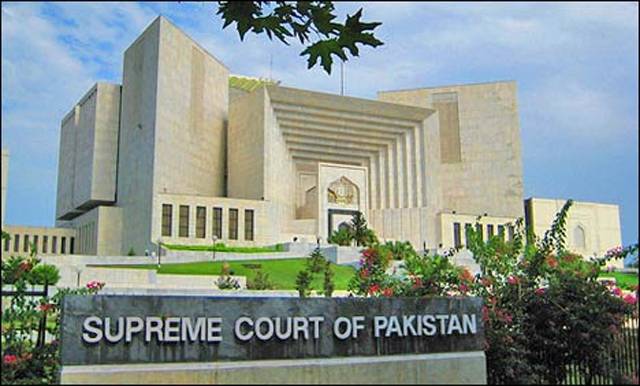ISLAMABAD - Allowing the petitions against the Election Act 2017, the Supreme Court on Monday declared them maintainable and issued notices to PML-N President Nawaz Sharif, the federation and the attorney-general for Pakistan.
A three-judge bench, headed by Chief Justice Mian Saqib Nisar, heard the 13 petitions filed against Election Act, 2017.
The petitioners are Zulfiqar Ahmed Bhutta, Sheikh Rashid Ahmed, All Pakistan Aam Admi Party, Justice Party, Muhammad Dawood Ghaznavi, Abdul Wadood Qureshi, Sheikh Ahsanud Din, Pakistan People’s Party, Jamshed Ahmed Khan Dasti, National Party, Imran Khan, Ishtiaq Ahmed Chaudhry and Gohar Nawaz Sindhu.
Almost all the petitions raised objections over Nawaz Sharif’s becoming the PML-N president even after the apex court’s judgment.
The chief justice said: “The parliament is supreme and we should not overstep the jurisdiction of this court. There are numerous judgments of the apex courts of other countries that have held the parliament is supreme and we have also discussed this issue in the recent judgment on Jehangir Tareen,” he said.
Justice Ijazul Ahsan said there is nothing in the Section 203 of the act that required to be declared ultra vires. Advocate Farrukh Naseem, representing Sheikh Rashid, argued Section 203 of Election Act, 2017, could not expressly permit any person, who was disqualified by the court of law, to head the political party.
He referred to the paragraph 92 of Panama leaks judgment in which Justice Ijazul Ahsan had observed: “People of Pakistan have fundamental right to be governed in accordance with law by those who fulfil the requirements of the Constitution and the law and whose financial dealings, earnings and expenditures are open to public scrutiny to show that they meet the test of honesty, integrity, financial probity and bona fide dealings.”
Naseem contended it was the right of every citizen to be governed by articles 9 and 17 of the Constitution.
The chief justice questioned whether a dishonest person under Article 62(1)(f) of Constitution ceases to be a member of the parliament. Barrister Farrukh said, “Article 63A of the Constitution is the nomenclature that what can’t be done directly can’t be done indirectly.” He said the party head controls it.
“Disqualification recorded by a court of law under articles 62 and 63 of the Constitution cannot be overtaken by sub-constitutional law and if a person cannot become parliamentarian because of the operation of constitutional law, he surely cannot become the head or an office-bearer of a political party,” Barrister Farrukh said.
Justice Ijaz questioned whether he wanted to say if the party head issued direction, the member could be debarred from giving vote of confidence or no-confidence in the election of prime minister or the chief minister. He further asked him to tell about the political process and the political hierarchy that the party head was so influential that one or the other way he controls the party.
Farrukh argued the parliamentary system has not developed in the political parties here as the members of the central executive committee are appointed by the party head and are not elected. He said Nawaz Sharif had appointed his nephew and daughter in the CEC of his party.
The chief justice remarked that was the case in every political party of Pakistan. Barrister Farrukh said Provision 5 of Section 203 has been omitted from the Election Act, 2017, making the law person-specific through an amendment. He said in Baz Muhammad Kakar case the court had declared that the person-specific law could not be implemented.
Farrukh said the Senate had passed a resolution against the act. He added 67 senators had signed the resolution.
The chief justice said all the political parties had voted for the Election Act. Justice Ijaz said but in the Senate the law had been passed with one-vote majority.
Sardar Latif Khosa, appearing on behalf of Pakistan People’s Party, said in parliamentary democracy, a party head is very important. The political party head installs the government and nominates prime minister or chief minister, Khosa said.
Earlier, the chief justice asked the counsels of various political parties and individuals how their fundamental rights are being infringed and directed them to cite judgments on the maintainability of their petitions.
“Give us the history, law and precedents of courts that they have struck down the law passed by the parliament,” he said.
The bench also discarded the contentions of Advocate Ikram Chaudhry regarding sections 16 and 202 of the Election Act, 2017, as not valid on the touchstone of the fundamental rights and adjourned hearing until January 23.






